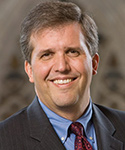Editor’s note: This is adapted from a spring 2011 talk to gifted middle school students who were part of Duke’s Talent Identification Program. Leadership Education at Duke Divinity teaches Christian leaders about strengthening their vocations and institutions by learning integrative thinking, balancing tradition and innovation, and cultivating thriving communities. Though the concepts are large, Jones presented them with a few remarkably simple words and symbols tailored for his audience.
Congratulations on your accomplishments thus far. It is a great day to be in Cameron Indoor Stadium to celebrate all that has brought you to this place. I hope you will remember this day for the rest of your lives.
This is only the beginning for you. There are lots of people who are talented but who don’t ever really develop and utilize their gifts and talents. The key difference between those who are talented and don’t ever really develop and those who maximize their talents is a commitment to developing the habits of a lifetime that will make a difference.
I want to think with you today about three powerful concepts. The first one is a very simple word: “and.” As you think about your own academic study, your own life, your own leadership, I urge you to think in ways that are integrative.
The world that you will eventually inherit from my generation -- your parents’ generation -- is a world that has made lots of mistakes by “either-or” thinking, by opposition.
The greatest intellectual challenges, the greatest discoveries, the greatest opportunities that you can have in your study as well as your life and leadership are going to be found not by thinking “this or that” but by learning how to think opposing ideas together.
If your inclination is in the sciences, spend time figuring out the links to the humanities. If you love to read novels, spend time looking at the brain and what neuroscience is telling us about the connections of emotions and the mind. Whatever your vocation, find ways to connect.
You will need to seek connections not just in your thoughts and ideas but with other people. Duke’s Coach Krzyzewski says that if you think about only one -- yourself -- you’re going to be pretty weak, because, like a single finger, a lone individual can be broken pretty easily. It’s when all five fingers, all five digits, come together into a fist that you really have extraordinary strength -- that’s the significance of a team.
The 2010 Duke team that won the men’s basketball national championship was not the most talented team Duke has ever had. Most people didn’t even think it was the most talented team in that year’s tournament. But Duke won because the players thought in terms of “and.” They knew how to work as a team.
Middle school is a challenging time: figuring out who you are and who other people are and how to intersect and interact with each other. It gets more complicated in high school and then in college, and it’s easy just to find the people who already think like you.
Yet the greatest opportunities for becoming not only really, really smart but also wise, for making the kinds of discoveries that our world desperately needs, are going to come by emphasizing the word “and.”
That’s also true when you interact with people from different cultures and backgrounds. Thinking about the global society in which we live, you need to be willing to cross borders by engaging with people who think differently and speak differently.
The more we can think about “and,” the better off the world will be and the more significant and sophisticated and successful your leadership will be.
The second concept is the word “then.” “Then” invites us to focus on the future and the opportunities for the future in a way that connects to the past.
“Then” suggests that there was something before us that is valuable to be built on, even as our fundamental orientation is to the future. The future is really bright for all of you, and yet we face daunting challenges.
I invite you to envision your future not only optimistically but, more determinatively, through the virtue of hope. To focus on the future through hope is to see an opportunity to make a huge difference in the world, even amidst trials and tribulations. It is to persevere and be resilient.
Now, I wouldn’t be true to my first word -- “and” -- if I said that your only option is to dream really, really big. That’s certainly a great option. Maybe, though, your dreams are small and significant -- to make an impact in your hometown, maybe to do something rather quiet and hidden -- and you don’t plan to become president of the United States or to be a major leader or to have a Nobel Prize attached to your name.
To focus on the future is to see where your gifts and the needs of the world intersect in ways that give hope to you, as well as to all those with whom you interact.
I have focused quite a bit of my time over the years on areas of the world that have been torn apart and have had much difficulty, including several countries in sub-Saharan Africa.
There’s one woman in Burundi whose name is Maggy Barankitse. In the civil war that tore apart Burundi, she was tied to a chair and made to watch as 72 family members and friends were killed brutally by a militia.
Somehow, miraculously, she was allowed to live. And afterward she gathered 30 children, most of them now orphaned, and said, “We’re going to rebuild this community.” They named it Maison Shalom,“house of peace.” And they built a school and they built a health clinic, and they started doing some farming to feed the people.
Slowly, hundreds of kids started getting educated. Then she built a swimming pool so the children could swim, and she built a movie theater and she talked some people in France into sending in Hollywood-style seating so that everybody could watch movies and have fun. She put a sign out front at the movie theater that said “No AK-47s,” because the militia wanted to come and watch the films.
When she was asked about what she did, about transforming a place of brokenness into a place of extraordinary hope, here’s what she said: “Love made me an inventor.” That’s the significance of “then,” of hope, of leaning into the future.
New opportunities -- whether it’s a great scientific discovery, a great musical accomplishment, writing the great novel of the first half of the 21st century, or helping people eat, learn and heal in rural Burundi -- new opportunities are all around us, and I hope you will be leaders in taking them on. “Then” keeps us focused on the future. “And then.”
And the last concept is the three dots, called an ellipsis. “And then …”
The significance of those dots is that I hope you will become storytellers. My generation got so preoccupied with reason in a very narrow and truncated way that we lost sight of the significance of stories.
Little did we know the life-transforming -- the world-transforming -- imagination that a scientist like Stephen Hawking would develop as a storyteller in addition to a scientist. Or the magic that J.K. Rowling could weave in the Harry Potter series. Or James Cameron’s work in “Avatar.” Or in a variety of musical forms and compositions and performances.
Storytelling can happen in jazz music, a symphony, a movie, video games, classic literature, and also in telling the origins of the world and the future destiny of it as a historian or a physicist. Whatever the vocation might be, we live by stories, and we are in need of hope-filled stories that draw people together. “And then …”
If you can live in ways that bring people together and you can live in an integrated fashion, you’ll help to cure and care for a world that’s torn apart by brokenness and “either-or” thinking. If you live by hope, you’ll always be propelled to ask, “What’s next?” and become lifelong learners with significant opportunities. And if you always think about that ellipsis, you’ll be learning to tell and listen to stories in ways that will capture people’s imaginations.
There are a lot of cynical people in the world who doubt whether we can continue to nurture and inspire people to be integrative, to be full of hope, to capture our imaginations through stories and discoveries.
They suspect that everyone is a taker, just in it for themselves. When I suggest to such cynics that there are amazing young people like you, they look at me skeptically, wanting proof -- they want names of people willing to live with a spirit of “And then …”
May I give them your name?







